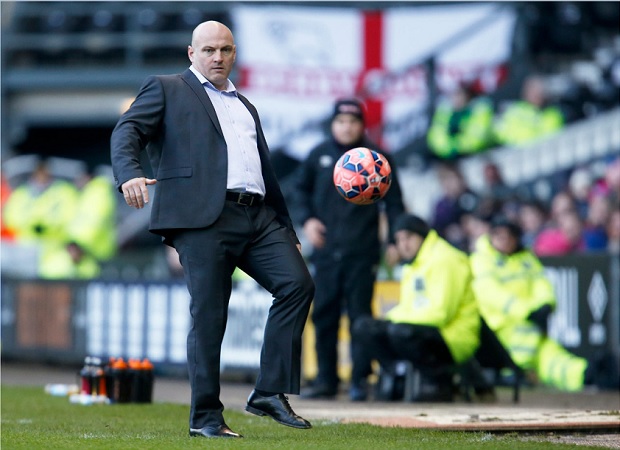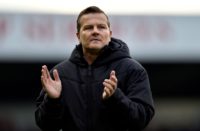By Chris Dunlavy
GARY Brabin knows just how hard life can get in Non-League. And he wants the virgin fans of Tranmere Rovers to brace themselves.
“There will be times when the football isn’t brilliant,” says the former Blackpool, Hull City and Doncaster Rovers midfielder.
“There will be times when it’s frustrating. There’ll be teams they’ve never heard of. There’ll be teams they have heard of and thought, ‘What the hell are we doing playing these?’
“But we’re in the same division for a reason and everybody in it deserves respect. That’s why I’ve never promised anyone I’m going to win promotion.
“What I have said is that I’ll get some passion back into the players. I will give the supporters goals and a team they want to watch. And we will be good enough to compete at the top.”
Brabin is setting out his manifesto from Prenton Park’s conference room, one of the few corners of the ground not yet overhauled.
Outside, decades-old furniture is being turfed into skips, plush new carpentry lies wrapped in cellophane and tradesmen of every type scamper in and out of the main stand.
Even Peter Shaw, the new CEO and former Liverpool director, is getting his hands dirty, instructing decorators in a tiny room above reception.
After successive relegations and years of neglect, this haggard old club is finally getting an overdue facelift. Since 2009, investment and ambition has been utterly absent, the focus simply on keeping the club staggering along.
Without the reluctant backing of former chairman Peter Johnson, Rovers would have gone to the wall. That’s six years of battling historic debts. Six years of budget cuts. Six years of loanees, has-beens and never-weres.
Nose-dive
For all their rich history, the 2000 League Cup finalists were dirt poor for a long time and the arrival of new owner Mark Palios, in August 2014, came too late to save the day. Now they are here, out of the Football League for the first time in 94 years.
“The club has nosedived,” says Brabin, coaxed out of a cushy coaching post at Everton to take the reins in May. “And it’s been very sad to watch.
“I was born and raised in Liverpool. I’ve had a lot of friends who played for Tranmere. And everybody on Merseyside remembers the old Friday night games here.
“If you loved football, you’d always go and watch those. It was a big part of growing up and I think a lot of people in the area shared the pain of these supporters last season.”
None more than Palios. A Tranmere legend, he made almost 300 appearances during nine years at Prenton Park before retraining as an accountant and rising to the head of the Football Association.

Now 62, he was persuaded to buy his old club by wife (and co-owner) Nicola, who told him to “stop moaning and do something about it”. Sadly, the rot was too deeply ingrained to do much.
“When we arrived, the die was cast,” admits Palios, who specialises in restructuring failing businesses. “But I said on the day we went down that while it’s devastating today, it’s not disastrous tomorrow. And I stand by that. Investment
“Non-League is very different to when I retired in 1985. Then, the gap was huge. Now, the best teams in the Conference are every bit as good as those towards the bottom of League Two. It’s not the culture shock it was.
“The club is also in a better financial position than it has been for a long time due to the sale of the training ground. We have investment and we have a plan.”
What Tranmere also have are fans. With an average gate of over 5,000, the Birkenhead boys were the seventh-best supported club in League Two last season, a resource Palios sees as invaluable.
“Supporters are everything,” he says. “And I don’t say that in a schmaltzy way. Look at Wimbledon. They had the franchise taken up the M1 to Milton Keynes – unfortunately before I was at the FA because I would never have allowed that to happen.
“But the essence, the spirit of the club – that stayed with the fans and they resurrected themselves. Few businesses anywhere in the world have that kind of brand loyalty and to neglect it is absolutely crazy.
“So we’ve talked to them. We tell them what works, what doesn’t. We’ve told them why we had to put up ticket prices.
“And if you get the fans involved, they will come up with answers you haven’t thought of. For instance, we believed there was a real groundswell of support for the return of Friday night football. I could understand that because when I played it was a fortress.
“But when we surveyed the fans, we realised that the quiet majority were happy playing on Saturdays. These are simple things to do but they make a big difference.”
Above all, however, those fans want a team – and a manager – capable of dealing with the pressure of being the Vanarama National League‘s biggest hitters.
“You can speak to your supporters until you’re blue in the face,” admits Palios. “But they will always have ambition. The day you kill that, is the day you kill the club. So we wanted a manager who knew the league but, more importantly, had experienced the weight of expectation.”
Which is where Brabin comes in. A veteran of spells in the hothouse at Cambridge and Luton, he twice came within 90 minutes of promotion to the Football League only to suffer play-off heartbreak at Wembley in 2009 and the Etihad two years later, where the Hatters lost on penalties to AFC Wimbledon after Jason Walker’s late header had hit the woodwork.
“I was a penalty away,” smiles Brabin, who spent the first half of last season at Southport before joining Everton’s academy in January. “I was the paint off the inside of the post away. But I’ve learned loads from it.
History
“The Luton experience was great. I never completed a full season but I still took them to a play-off final and I was on course to do it again. But there was a lot of frustration about the place and I’ve spoken to Mark at length about how that needs to be managed.
“That’s why recruitment is so important. You need people who can play and perform in front of a crowd. You want people who are local – first to understand the passion of the club and secondly for financial reasons.
“And you need people who can handle the pressure of being the favourite. In the past, Tranmere have had a lot of success playing the underdog. It won’t be like that this year. Teams will come here and to frustrate us and you need players who will thrive on that environment.”
To that end, Brabin has signed a host of Conference veterans like striker Andy Mangan, ex-Mansfield centre-half Martin Riley and Wrexham‘s FA Trophy-winning midfielder Jay Harris.
And Brabin, who started the job with just five contracted players (“but we were still favourites,” he laughs, “work that one out!”) has given them all the same message.
“Me and Mark have both said the same thing to the players,” he says. “We’d have loved to play for this team.
“We’d have loved to be in this situation. To have the chance to go down in history as the ones who turned it around.
“It’ll be tough and it won’t be a quick fix. We’ll be up against financially strong clubs with no expectation and that’s a powerful combination.
“But we’ve got a chairman who is turning the club around and players who are good enough to compete. It’s been a bleak few years but we’re bouncing back.”






















